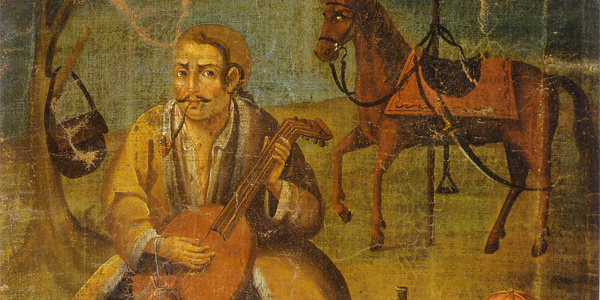Jasmine Putney, The Daily Iowan

For 15 years, Ukrainian musician Roman Turovsky has playing the music that settled deep in his heart many years before.
“My earliest childhood memories were of girls crossing the river to milk the cows grazing on the other side. They were singing, and now I know exactly what: polyphonic laments that found me 40 years later,” he said.
Though initially compelled to remain in the shadows as a composer, Turovsky later sought the adrenaline of performance. At 7 p.m. March 15 at the Englert Theater, 221 E. Washington St., Turovsky will make his first appearance at the ninth-annual Russian Guitar Festival alongside other virtuosos in Russian guitar music. This will mark the second time for the Englert to host the event.
The festival is planned by the International Academy for Russian Music, Arts, and Culture, a nonprofit organization aiming to promote knowledge about the Russian guitar and the music associated with it. Academy President William Reisinger said this year is the group’s biggest festival in terms of the number of performers attending and the wide range of music.
“Our past festivals have drawn hundreds of attendees from Iowa City and Cedar Rapids but also those who travel here from farther away to attend,” he said. “Thanks to [the academy], Iowa City is recognized all over the world, including in Russia, as the center of [the Russian guitar’s] revival.”
Unlike the six-string guitar common in the Western world, the Russian guitar possesses an extra string. This string makes the guitar different from its six-string sisters, with a rich history of music written specifically for the instrument.
“Seven-string guitar music actually ranges pretty broadly. Some of it is slow and romantic, some is upbeat and exciting,” Reisinger said. “Our various events will each highlight different themes and styles, so there is something for a lot of people.”
Though the seven-string guitar was very common during the 19th century, the instrument and its distinctive niche of music have since faded. Stefan Wester, a Swedish musician from the age of 11 and performer in the festival, said he didn’t encounter the Russian guitar style until the mid-1990s.
“This music has been a well-hidden treasure,” he said. “I never learned about it from any of my teachers, and it is not mentioned in any music history books that I know of, not even in the books about the Classical Guitar History.”
Ten years later, in 2006, Wester came across the seven-string music again in a dissertation by Russian Guitar Festival Cofounder, Artistic Director, and University of Iowa Adjunct Assistant Professor Oleg Timofeyev. Wester said that after their conversation, Timofeyev was helpful in getting him to understand the instrument better. Though he still plays the six-string, Wester enjoys being able to find unusual and interesting music to play with the seven-string.
He regards this opportunity to play in the Russian Guitar Festival as the highlight of his musical career.
“I will probably continue to play the Russian guitar until the end of time,” he said. “This is not a short-lived project.”
The work and efforts by Timofeyev did more than inspire musicians. His research has led him to become the world expert in the Russian guitar and the father of the style’s modern day revival. Timofeyev made Iowa the center of the style’s rebirth because, he said, this particular genre is not well-accepted in its country.
“In Russia, there is a strong jealous competition between six-string guitar and seven-string guitar. Six-string guitars are generally more popular, more well-distributed,” he said. “A lot of those people have a strong prejudice against Russian guitar, and they don’t expect anything truly artistic. Having a concert like what were having in today’s Russia would be pretty much impossible.”
Timofeyev said they chose to focus much of this year’s festival on Ukrainian music and to feature Russian gypsy songs and Yiddish tunes. Turovsky said Ukrainian artists such as him are thrilled to continue spreading their music in new parts of the world as representatives of the country where the seven-string guitar got its start.
“[My biggest musical success] is the interest with which my Ukrainian-theme compositions were received by the distant public, which knew little about Ukraine and its culture,” he said.
However, Timofeyev said, this Ukrainian theme is far more significant than introducing new music or paying homage to the original country of seven-string music.
“Right now, there is a war in Ukraine, and regardless of what side of this conflict you may be, it is a bloody event, and people are dying every day,” he said. “The goal of our festival is so that Russians and Ukrainians during the time of war will peacefully play music together.”